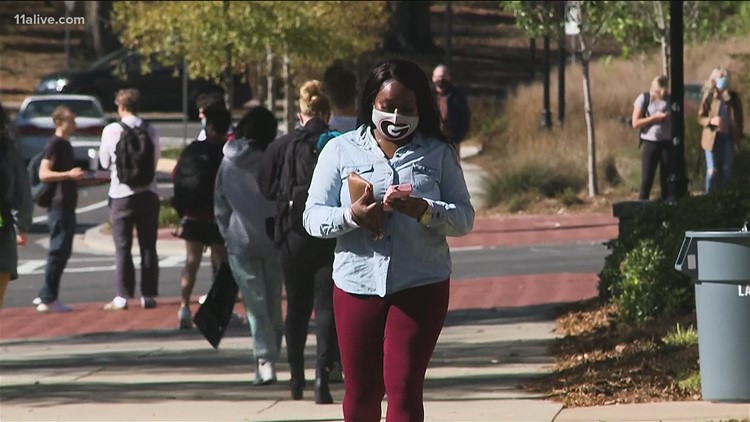ATHENS, Ga. — As soon as college students arrived back on campus, COVID cases spiked.
The social nature of young adults gave the virus easy access to spread. Students at the University of Georgia studying journalism found themselves covering the virus impact – and living it.
The Reveal investigator Rebecca Lindstrom sat down to talk with two of them soon to graduate and found that, whether you’ve been reporting for two decades or two years, COVID's impact on journalists is much the same.
“You're still turning stories, even if maybe your video quality isn't as good as you want it to be or you're having to work with your phone and a ring light instead of a nice camera,” said Jillian Tracy.
Tracy expected to spend her last year working in UGA’s busy newsroom, rotating through the various assignments from anchor to assignment desk. But like 11Alive’s studios, access is limited. Reporters work from home, or in this case, their dorm.
But both said the pandemic has actually made information easier to access.
“People just want to be heard,” Danielle Harvey said. “I think it's made me even more empathetic and slower to judge because of how, how eager people are to tell me about the things that they're going through, what they're experiencing.”
“I think the mentality is kind of we're all going through this. So, there's no hierarchy of there's not someone I can't reach. You know, I’ll give the CDC a call because I know they’re going through this,” added Tracy. “You feel they’re a little bit more accessible, I think, because you know that, more than likely, they are probably working from home in sweatpants.”
COVID has taught these journalists an important lesson about bias, even their own.
“I think that I'm very passionate about testing being mandatory, more testing being available and students having access to that. And I want it to really emphasize that. But my professor just drilled into me, you know, just the facts, not any other outside opinions or things like that,” said Harvey.
That’s why Harvey said people need to take time to research where their information is coming from and not be so quick to believe when it pops up in their newsfeed or timeline.
“Do a little bit of digging to see where you’ve heard something and where it came from,” she said.
Despite the technological shortfalls, there have been plenty of stories to cover this year, especially with Georgia’s presidential and senate runoff election. But, now, it seems everything comes with a COVID angle, like how we make sure everyone stays safe at the polls.
Last semester, as COVID crept into our community, Tracy remembers writing a story about a woman in quarantine after a trip to China.
“At that point, it felt so far removed, it didn't feel like it was going to come to impact our lives at any point past that,” said Tracy.
When asked if the media should stop covering COVID, both said no.
“Oh, it has become tedious, but I think it's still something that we need to talk about,” Harvey said.
“It’s a unique situation. The things I’m reporting on are affecting me directly. Every pharmacist I’ve talked to, every epidemiologist, every, just, concerned person is a new perspective,” added Tracy.
And they said we need to learn from those discussions. In the fall, more than 8,000 students returned to live on campus. Students attending labs and hybrid classes drew even more to the school, giving COVID a new path to spread.
Tracy said the administration should have anticipated the parties, even if they couldn’t foresee the unintended consequences of virtual learning.
“The ability to go to an SEC football game and live the tailgate and go out with your friends in downtown is a big appeal for a lot of students,” she said. “I think people have been using the ability of virtual classes to say, hey, let's go somewhere else for a week and hang out here. And so, I think there's a lot more traveling and a lot more socializing and a lot more crossing of paths between people of different social groups.”
But even for reporters covering the community, there’s a feeling of isolation.
“Virtual classes sound like a great idea. But when you're staring at your computer screen for six to eight hours a day, all you want to do is … walk across campus and have 10 minutes to keep your eyes off of technology,” said Tracy.
“You realize that, with being here and being so isolated, that you need those people that you love, you need that human connection,” said Harvey. “Sometimes, I would just look around in my room for, like, something to wash, like a throw pillow … or the bathroom rugs just so that I can do laundry and see that there are other people around.”



